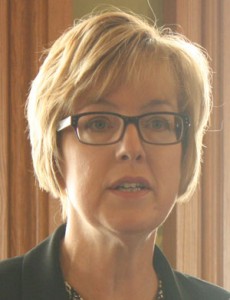
By Anne Marie Amacher
DAVENPORT — With the success of school tuition organizations (STOs), plans are to look at additional options to help Iowans afford education at nonpublic schools throughout the state.
More than 50 parents, educators and principals gathered Nov. 6 in the Assumption High School library to hear about a possible new option to help parents send their children to schools of choice.
Trish Wilger, executive director of Iowa Alliance for Choice in Education (Iowa ACE), said STOs have been in existence since 2006 and came about with help from supporters in Scott County.
A member of St. Paul the Apostle Parish in Davenport, Wilger said the state has 12 STOs that benefit students in Catholic and other private schools.
She said Iowa ACE has been looking at other options for school choice and is working with the Iowa Catholic Conference and others to help educate the public and lawmakers on this issue.
Supporters for choice point to the success of the STOs, which initially had a funding cap of $2.5 million. The Iowa Legislature has increased the cap several times over the years and during the last legislative session placed the cap at $12 million for 2014. The lawmakers also added more entities that can contribute to STOs, such as LLCs and some estates.
“Where do we go from here?” Wilger asked. She said meetings are being held across the state to let people know that supporters for school choice are looking at additional ways to support nonpublic school education.
Tom Chapman, executive director of the Iowa Catholic Conference (ICC), noted that the ICC and Iowa ACE are in the early stages of developing educational savings accounts or ESAs. “This is the next frontier,” he said.
If ESAs were to be approved, parents would inform the state in February or March of a given year that their child would attend an accredited private school in the fall. In general, the state would put $4,500 to $5,000 into a child’s ESA to be used for tuition.
“We are talking about state money. Not the local tax levy money. But I want to be clear – this will cost the state money. But the amount will be less than education reform bills (the legislators) have passed,” Chapman said.
He thinks it would be difficult to see an ESA measure approved this coming year. “They cut taxes last session and it’s an election year. So it will be a short session.”
Parental choice typically is Republican-supported in the United States, he noted. “But it’s different here in Iowa. When the STO measure passed, it passed well by both parties.”
The idea of ESAs will be introduced gently. This is not a voucher system, so it shouldn’t be constitutionally challenged. “It’s a parent’s choice.” Also, the money is given to parents, not directly to the nonpublic schools.
He said the Friedman Foundation for Educational Choice conducted 605 phone interviews last summer to survey registered voters in Iowa about school choice. The foundation learned that 7 percent of those polled had children in nonpublic schools. But 38 percent of voters polled favor sending their children to nonpublic schools.
“Iowa people really like their schools. Iowans like education. They like private schools. They like choice,” Chapman said.

Survey results show 57 percent of Iowans are likely to support universal eligibility for ESAs, which allow parents to use their children’s education funding to choose among public and private schools, online education programs, certified private tutors, public and private schools, community colleges and even universities.
Following the presentation, one person asked what would happen with money left over in an ESA account after tuition is paid. Wilger said the money remains in the ESA account and can be used for college.
Another person asked whether STOs are limited to Iowa residents. Yes, as would the ESAs.
Wilger said a meeting has been scheduled with Gov. Terry Branstad and legislative leaders this week to start talking about education choices. “Word will start to trickle down,” Wilger said.
Linda Duffy, former president of Assumption High School, said she remembered that when talk of STOs began people looked at her as if she had three heads. “It takes time to introduce the idea.”
In the meantime, $25,000 needs to be raised for PACs (political action committees) to support legislators. The cost is being divided between the various entities that make up the accredited nonpublic schools. The Diocese of Davenport area is asked to raise $3,100. The money raised is used for legislators to support ESAs.







